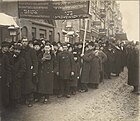Vladimir Medem

Vladimir Davidovich Medem, né Grinberg (
institution, bears his name.| Part of a series on |
| Bundism |
|---|
 |
| 1890s to World War I |
|
| Interwar years and World War II |
| After 1945 |
|
| People |
| Press |
| Songs |
| Associated organisations |
| Splinter groups |
|
| Categories |
Life
Son of a Russian medical officer who had converted from Judaism to
Medem only learned Yiddish at the age of 22; the language was taboo in his family environment. Because of a student strike in 1899, he had to leave the university, and at that time, inspired by
In 1918 the Bund was reestablished as a separate party in newly independent Poland, where Medem once again became its leading theorist.[1]
Medem emigrated to the United States in 1921, arriving in New York in mid January; in the U.S. he served as a representative of the Bund in Poland.[4] He died in New York less than two years later, on 9 January 1923. He is buried at Mount Carmel Cemetery in Queens, NY.[4]
Influence and legacy
The Jewish Labour Bund was committed to the cultural and national rights of Jews in Eastern Europe. In this regard, Medem dared to oppose the view of Russian Marxists, and even of
Main writings
- 1904: Social Democracy and the National Question
- 1916: The doctrine of the Bund
- 1938 (posthumous): Yiddish: Di legende fun der jidišher arbeter-bawegung (Hg. Gros, Naftole; Gros, Naftoli). Verlag Kinder-Ring, 87 S., illustrated; reedited by National Yiddish Book Center, Amherst, Mass. (USA) 1999. Collection: "Steven Spielbergdigital Yiddish library" No. 06827
See also
References
- ^ a b Gechtman, Roni (30 August 2010). "Medem, Vladimir Davidovich". YIVO Encyclopedia of Jews in Eastern Europe. Retrieved 2016-12-09.
- ^ a b c d An Introduction to Bundism (1897-1903), retrieved 2023-07-19
- ^ The Second Aliyah (1905-1915), retrieved 2023-07-19
- ^ a b "Genose Medem toyt". Forverts, 10 January 1923, p. 1, 8. English translation by Daniela Goodman Rabner, available at Mapping Yiddish New York. Institute for Israel and Jewish Studies, Columbia University. jewishstudiescolumbia.com. Retrieved 2022-10-10.
External links
- Vladimir Medem in the German National Library catalogue
- YIVO Encyclopedia of East European Jewry
- Vladimir Medem, "On Terror", 1918
- Roni Gechtman, "National-Cultural Autonomy and 'Neutralism': Vladimir Medem's Marxist Analysis of the National Question, 1903-1920" 2007
- Vladimir Medem (1 June 1979). Vladimir Medem, the life and soul of a legendary Jewish socialist. Ktav Pub. House. ISBN 978-0-87068-332-9.
- A photo of the graves of Vladimir Medem, Sholem Aleichem, Morris Rosenfeld and others at the Mt Carmel Cemetery: [1]
